Related Research Articles

Hitman 2: Silent Assassin is a 2002 stealth video game developed by IO Interactive and published by Eidos Interactive for Microsoft Windows, PlayStation 2, Xbox and GameCube. The game was re-released for Windows through the Steam online distribution service, and a DRM-free version was later made available through GOG.com. It is the second installment in the Hitman video game series and the sequel to Hitman: Codename 47. The single-player story once again follows Agent 47, a genetically enhanced human clone who worked for the International Contract Agency (ICA) as an assassin. Following the events of Codename 47, the former contract killer has retired and started a peaceful life at a church, but after his only friend, Reverend Emilio Vittorio, is kidnapped by unknown assailants, 47 resumes work for the ICA in hopes of tracking him down.

Final Fantasy XI, also known as Final Fantasy XI Online, is a massively multiplayer online role-playing game (MMORPG), originally developed and published by Square and then published by Square Enix as the eleventh main installment of the Final Fantasy series. Designed and produced by Hiromichi Tanaka, it was released in Japan on May 16, 2002, for PlayStation 2 and Microsoft Windows-based personal computers in November of that year. The game was the first MMORPG to offer cross-platform play between PlayStation 2 and Windows. It was later released for the Xbox 360 in April 2006. All versions of the game require a monthly subscription to play.

Mega Man X: Command Mission, known in Japan as Rockman X: Command Mission (ロックマンXコマンドミッション), is a 2004 role-playing video game developed by Capcom for the PlayStation 2 and GameCube. The game is a spin-off of the Mega Man X franchise. It was released in Japan on July 29, 2004, with releases in North America and PAL regions following in September and November.

Mercenaries: Playground of Destruction is an action-adventure video game developed by Pandemic Studios and published by LucasArts for PlayStation 2 and Xbox. The game features an open world environment, with elements of potential stealth gaming and reputation-based social mechanics, and is set during a fictitious multi-national military action in North Korea. The player gains control of one of three mercenary main characters and completes contracts in the war-torn country for profit and to prevent a nuclear war. Critics gave favorable reviews to the game, in particular praising its focus on explosive mayhem.

A quest, or mission, is a task within video games that a player-controlled character, party, or group of characters may complete in order to gain a reward. Quests are most commonly seen in role-playing games and massively multiplayer online games. Rewards may include loot such as items or in-game currency, access to new level locations or areas, an increase in the character's experience in order to learn new skills and abilities, or any combination of the above.

Samurai Warriors is the first title in the series of hack and slash video games created by Koei's Omega Force team based closely around the Sengoku period of Japanese history and is a sister series of the Dynasty Warriors series, released for the PlayStation 2 and Xbox in 2004. A port of this game called Samurai Warriors: State of War has been released for the PlayStation Portable, which includes additional multiplayer features.
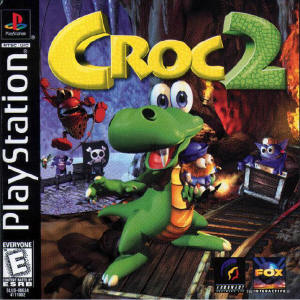
Croc 2 is a 1999 platform game developed by Argonaut Software and published by Fox Interactive. The sequel to Croc: Legend of the Gobbos, it revolves around the title character going on a quest to search for his missing parents, as well as saving the Inventor Gobbo from a revived Baron Dante.

Armored Core: Project Phantasma is a 1997 third-person shooter mecha video game developed and published by FromSoftware for the PlayStation. Project Phantasma is the second entry in the Armored Core series and a prequel to the original Armored Core. The game was not released in Europe.

Armored Core 3 is a 2002 third-person shooter mecha video game developed by FromSoftware for the PlayStation 2. It is the sixth entry in the Armored Core series. Armored Core 3 acts as a reboot for the franchise and begins a storyline that would continue through Armored Core: Last Raven. In 2009, Armored Core 3 was ported to the PlayStation Portable.

Metal Slug 2 is a run and gun video game developed by SNK. It was originally released in 1998 for the Neo-Geo MVS arcade platform as the sequel to the 1996 game Metal Slug. The original version of the game had extensive slowdown and performance issues, eventually leading SNK to release a modified version in 1999 titled Metal Slug X: Super Vehicle-001 (メタルスラッグX). It has been ported to the Neo Geo CD, PlayStation, Virtual Console, iOS and Android, and to the Wii, PlayStation Portable and PlayStation 2. The game added several new features to the gameplay of the original Metal Slug, such as new weapons, vehicles and the ability to transform the character. It received generally positive reviews. It was followed by Metal Slug 3 released in 2000.

SOCOM U.S. Navy SEALs: Fireteam Bravo 2 is a tactical third-person shooter video game developed by Zipper Interactive and published by Sony Computer Entertainment for the PlayStation Portable. It is the sequel to SOCOM U.S. Navy SEALs: Fireteam Bravo. This game is able to sync with the PlayStation 2 game SOCOM U.S. Navy SEALs: Combined Assault in order to unlock bonus features.
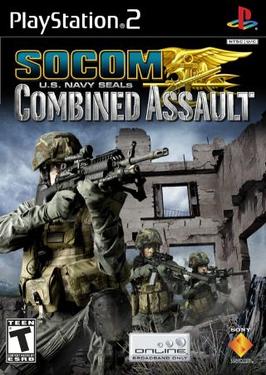
SOCOM U.S. Navy SEALs: Combined Assault is a tactical third-person shooter video game developed by Zipper Interactive and published by Sony Computer Entertainment for the PlayStation 2. It is the last installment of the series to be released on the PlayStation 2.
Runabout is a series of destruction-themed driving games developed by Climax Entertainment. Games in this series have been released on PlayStation, PlayStation 2, Dreamcast and Nintendo 3DS. Runabout's main missions consist of the player driving from point A to point B in order to pick up or deliver an item. The first game had more than one map to choose from, whereas the later ones utilized one city map modeled after an actual location—San Francisco in Super Runabout (Dreamcast) and New York in Runabout 3 Neo Age . Players start off with just a few vehicles. When players complete a mission, destroy as much as they can, or drive without damaging anything, they are rewarded with a new vehicle. In the newer games, players are also rewarded with paint jobs and special abilities for each individual vehicle.

Disgaea is a series of tactical role-playing video games created and developed by Nippon Ichi. The series debuted in Japan on January 30, 2003, with Disgaea: Hour of Darkness, later re-released as Disgaea: Afternoon of Darkness and Disgaea DS. One of Nippon Ichi's most popular franchises, it has branched off into both a manga and anime series. The Disgaea games are known for complex gameplay, extremely high maximum stats and humorous dialogue. The Disgaea series has shipped 5 million copies as of 2021.
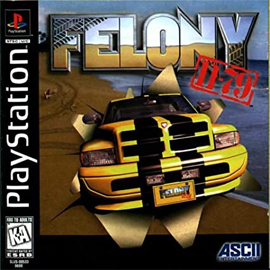
Felony 11-79, known in Japan as Runabout, is a video game developed by Climax and published by Yanoman and ASCII for the PlayStation in 1997. It was part of a late 1990s wave of driving games which encourage the player to create chaos and destruction, being preceded by Die Hard Trilogy and Carmageddon. A sequel to the game, called Super Runabout: San Francisco Edition, was released in 2000.

Destiny is an online first-person shooter video game developed by Bungie. It was released worldwide on September 9, 2014, for the PlayStation 3, PlayStation 4, Xbox 360, and Xbox One consoles. Destiny marked Bungie's first new console franchise since the Halo series, and it was the first game in a ten-year agreement between Bungie and Activision. Set in a "mythological science fiction" world, the game features a multiplayer "shared-world" environment with elements of role-playing games. Activities in Destiny are divided among player versus environment (PvE) and player versus player (PvP) game types. In addition to normal story missions, PvE features three-player "strikes" and six-player raids. A free roam patrol mode is also available for each destination which feature public events. PvP features objective-based modes, as well as traditional deathmatch game modes.
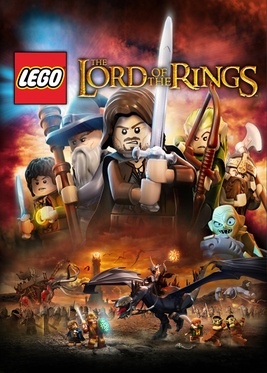
Lego The Lord of the Rings is a Lego-themed action-adventure video game developed by Traveller's Tales, that was released on Nintendo 3DS, Nintendo DS, PlayStation Vita, Microsoft Windows, Wii, PlayStation 3, and Xbox 360. The OS X version of the game, published by Feral Interactive, was released on 21 February 2013.
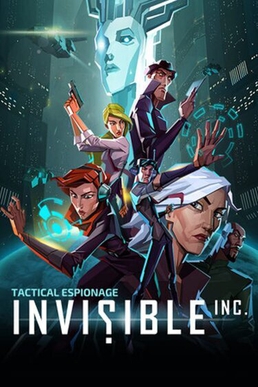
Invisible, Inc. is a turn-based tactics stealth game incorporating elements of roguelike gameplay, by Klei Entertainment. The player acts as the remote operator for an espionage agency that has come under attack from multinational corporations, and directs agents in covert missions, acquiring resources and support in order to enable relocation of the agency's computer system to a safe haven within a limited amount of time.

Super Hero Generation is a tactical role-playing game produced by Bandai Namco Games that features characters from the Kamen Rider, Ultraman and Gundam, three iconic Japanese TV series. Released for the PlayStation 3 and PlayStation Vita in Japan on October 23, 2014, Super Hero Generation has many similarities to the Super Robot Wars series, also produced by Bandai Namco.
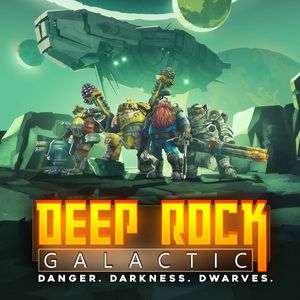
Deep Rock Galactic is a cooperative first-person shooter video game developed by Danish studio Ghost Ship Games and published by Coffee Stain Publishing. Deep Rock Galactic was fully released on May 13, 2020 for Microsoft Windows and Xbox One after its early access release in February 28, 2018. The game was later released for PlayStation 4 and PlayStation 5 in January 2022, and for Xbox Series X/S in September 2022.